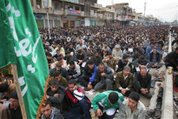Iraq Sunni, Shiite Groups Threaten Boycott of Government

By Patrick Quinn
The Associated Press
Thursday 22 December 2005
Dozens of Sunni Arab and secular Shiite groups threatened to boycott Iraq's new legislature Thursday if complaints about tainted voting are not reviewed by an international body.
A representative for former Prime Minister Ayad Allawi described the Dec. 15 vote as "fraudulent" and the elected lawmakers "illegitimate."
A joint statement issued by 35 political groups that competed in last week's elections said the Independent Electoral Commission of Iraq, which oversaw the ballot, should be disbanded.
It also said the more than 1,250 complaints about fraud, ballot box stuffing and intimidation should be reviewed by international organizations such as the United Nations, the European Union, the Organization of the Islamic Conference or the Arab League.
There was no one available for comment at the UN office in Baghdad, but a world body spokesman in New York rejected a review.
"The UN is not going to conduct an independent review of the election results," UN associate spokesman Robert Sullivan said.
The electoral commission, or IECI, that monitored the elections reported receiving more than 1,500 complaints of violations - of which 25 were described as serious. However, it does not expect the complaints to change the overall result, to be announced in January.
The groups signing the joint statement included the main Sunni Arab coalition - Adnan al-Dulaimi's Iraqi Accordance Front - and a secular Shiite bloc headed by Allawi.
A senior member of the Shiite religious United Iraqi Alliance, the group that preliminary results show leading in the polls, said the protesters should accept the results.
"These statements will lead the country to new chaos," Ali al-Adib said. "Who can guarantee that when the elections are rerun they will not reject them again?"
Al-Adib, also a member of the Supreme Council of the Islamic Revolution in Iraq, said the alliance now helping govern Iraq also had complaints.
"We also have complaints and we also have evidence, and we are waiting for the decision of the electoral commission," he said. "They have to accept the will of the Iraqi people, the will of the majority. The political process will continue even if they boycott it."
He said those groups rejecting the election results "are the same who called for the boycotting of the last elections and said 'no' to the constitution."
Sunni Arab groups had called on the minority to boycott the Jan. 30 elections and to reject the constitution approved in an Oct. 15 referendum. The Sunni-dominated insurgency had threatened to kill anyone participating in the Jan. 30 elections but pledged not to carry out any attacks last week.
Sunni Arabs fear being marginalized. Most estimates say they make up about 20 percent of the population, although many in the minority claim they comprise 40 percent of Iraq's estimated 27 million people. Shiites make up an estimated 60 percent of the population and Kurds 20 percent.
Allawi did not attend Thursday's meeting, held in his political headquarters in the heavily fortified Green Zone.
"We hold the IECI responsible for all the violations which took place during the elections and demand that it be dissolved and a suitable alternative to be found," said the statement read by Ali al-Timimi, the head of the Hilla al-Fayha List, a secular Shiite ticket Babil province south of the capital.
"If this is not achieved, then we will have no choice but to refuse the results and boycott the new parliament."
More than 100 politicians and representative of various groups participated in the meeting, held in a smoke-filled room.
Allawi representative Ibrahim al-Janabi took the accusations one step further and described last week's elections in all 18 provinces as "fraudulent."
"These elections are fraudulent, they are fraudulent, and the next parliament is illegitimate. We reject all this process," al-Janabi told a news conference.
Results released Tuesday showed the governing Shiite grouping, the United Iraqi Alliance, winning strong majorities not only in Baghdad but in the largely Shiite southern provinces. Sunni Arabs turned out in large numbers, unlike January's election.
The electoral commission put total turnout at nearly 70 percent of the country's 15.5 million voters. The Jan. 30 elections saw a turnout of 58 percent, while 63 percent participated in the October referendum.
Politicians say that based on preliminary results, the alliance seems on course to win between 120 and 130 seats - compared with 140 now.
Sunni Arabs may increase their seats from 17 to more than 40, while the Kurds are expected to hold between 40 and 50. Allawi, who controls 40 seats, is expected to drop to 20 seats or fewer.
Despite the lead, the Shiite religious bloc likely will fall short of the 184 seats necessary to choose a new president, the first step needed to form a government, and will have to find a coalition partner in the 275-member parliament.
Go to Original




0 Comments:
Post a Comment
<< Home